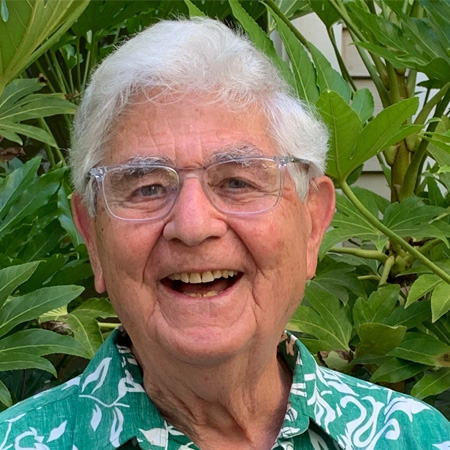Busy is an understated adjective for the lively and peripatetic Arthur Ginsburg.
In fact, it was a little tricky to find a time to interview Arthur for this story.
“Tuesday and Thursday mornings I go to the Mt. Tabor area for Tai Chi,” said Arthur, Cedar Sinai Park’s “oldest” cyclist, who turns 94 in May. “On Fridays I usually play flute with my pianist but only for an hour or so in the late morning and then I lead the Food Committee in the afternoons. Some Wednesday mornings I play flute trios.” Arthur has choir on Monday afternoons. And then there’s leading the Book Club the fourth Thursday of every month and leading the monthly Resident Council as vice president. When an interview time was finally settled upon, Arthur was well-prepared, with a thick dossier ready to hand off about his life and accomplishments, as well as mementos of his time at Cedar Sinai Park.
“I’m a cultural Jew and it’s nice to be surrounded by other cultural Jews, although I enjoy the fact that maybe 25 percent of the place is not Jewish,” said Arthur. “I would use the Yiddish word, Haimish, to describe Cedar Sinai Park, because it is a simple, homey place.”
Arthur moved into Rose Schnitzer Manor in 2014 a few months after his beloved wife of 63 years, Judith, died of complications from a hip injury.
“We had planned to come here together and she never made it,” said Arthur. “She was 83. After my wife died, I did not want to be alone. I think it’s better to be with other people, and of course, here, you can be alone, but you don’t have to be alone.”
Arthur believes Judith would have liked Cedar Sinai Park.
You walk in the door here and it looks like a home,” he said. “It’s got pictures on the walls and carpets and statuary and a very friendly staff. I have a lovely apartment with a view of the forest. It feels like a home.
Arthur grew up in Philadelphia and attended Temple University right after WWII, graduating in 1950 with a bachelor of arts in radio and theater. There, he met 17-year-old Judith Goodman, a talented pianist.
“I had a wonderful education and was very active in school,” he said. “I did all kinds of stuff, like acting.” Arthur was an on-air personality in South Carolina during college, did summer stock on Cape Cod, toured with a children’s theater, and was on a soap opera. He was also assistant director at WCAU-TV after college.
“But it was sporadic,” he said. “It wasn’t enough. And one day I came home and my wife, who was 19 at the time, looked at me and said in Yiddish ‘we are not making a living.’ She was working, and teaching and times were a little tough.”
Twenty-two-year-old Arthur returned to school, and like his father before him, graduated from Temple’s Beasley School of Law.
“I went through law school in two-and-a-half years by going summers, as well as during the week, and worked weekends and nights in radio spinning records,” he said.
Right after passing the bar, Arthur was drafted into the Korean War. Thanks to his law background, Arthur was assigned a detailed research and investigations role in the United States Army’s Counter Intelligence Corps as a plainclothes agent. Son, Claude, arrived in 1954.
After the war, Arthur said he “got restless” and moved to Washington, D.C., obtaining a job as an administrative lawyer in the United States Department of Labor in the Office of the Solicitor interpreting labor laws for five years.
“I worked on workers’ compensation cases, defending the government against insurance claims,” he said. Son, Ian, was born in 1959.
I thought, maybe there is something else I’d like to do, something different.
Looking for change again, Arthur then turned to the Federal Communications Commission and was hired immediately. This was 1961. He stayed for 26 years handling complaints and communications enforcement law compliance, working his way up to become the division chief. His tenure overlapped with many quiz show scandals, false promotions, and hoaxes, as well as equal time election laws.
“This was the really early days of television,” said Arthur. “Any time a congressperson got a complaint about something people heard or didn’t like on the radio I was one of the guys to handle it, or I’d send out one of my crew to investigate, anywhere in the country. It was very difficult, very active, but a wonderful job and I loved Washington and we traveled a lot.”
Then one day, Arthur said he looked out the window and decided he was “middle aged.”
Said Arthur: “I thought, maybe there is something else I’d like to do, something different.”
That something was teaching journalism at the University of Texas in Austin. Judith, who had been teaching all those years, was hired as a part-time chamber music coach.
“The first day I went into class was the first day I ever taught,” said Arthur. “Nobody ever teaches a college professor to teach.”
Arthur taught and organized seminars on first amendment law and freedom of speech. “We would bring circuit court judges down and the top journalists in the country. Mrs. [Lady Bird] Johnson would come and sit in the front row. And she invited me to her famous home on the Pedernales River near Austin one evening with all the people in the seminar for a beautiful sit-down dinner with waiters in white gloves. [President Lyndon] Johnson had died [seven years previously]. And she gave me a tour of the house and his desk that she had preserved. It was interesting and very lovely.”
Arthurs’ contract at the University of Texas was up after two years, the United States was in a depression, and then oil prices plummeted. The Ginsburg’s moved to Sedona, with Arthur teaching at Northern Arizona University in Flagstaff, and Judith creating a chamber music festival. They built a beautiful home with views of the red rock mountain formations. Arthur was also hired to write a newspaper column, and develop short, on-air editorials for the local television station.
One of the ways to survive is to live in the present, I miss my wife every day. But this is now and this is here, and I have things to do and things I want to do. I really like it here.
In 1994, his final year in Arizona, Arthur was a visiting professor at Northeastern University in Boston, enjoying the culture available.
Arthur and Judith had spent many a summer at Reed College attending their chamber music festivals. In 1995, they moved to Portland for good with Arthur teaching graduate seminars in media law at the now-defunct Marylhurst College.
He and Judith biked a lot, taking their fold-up bikes to Seaside for the day. They lived in southeast Portland off Clinton Street and liked to hike and sail.
Besides the flute which he’s been studying since he was 15, tai chi, reading voraciously, walking the grounds, and leading the Book Club and Food Committee and being vice president of the Resident Council, Arthur says he enjoys meeting new people.”
“I go out to eat a lot and to the ballet and I like to travel with friends,” he said.
Arthur is an avid biker, and despite a recent spill on a sharp corner from which he is still healing, Arthur just bought a new bike helmet and gloves and an air pump and is “ready for a new season” of cycling. A Rose Schnitzer Manor ad a year ago featured a photo of the young-at-heart Arthur geared up, smiling, and ready to ride.
“One of the ways to survive is to live in the present,” said Arthur. “I miss my wife every day. But this is now and this is here, and I have things to do and things I want to do. I really like it here.”



